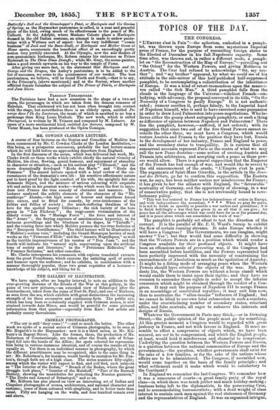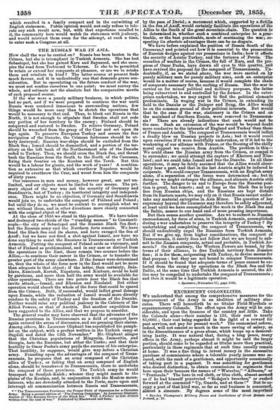TOPICS OF THE DAY.
THE CONGRRSS,
L'EMPIRE &est is Pain "—the aphorism, embodied in a pamph- let, was thrown upon Europe from some mysterious Imperial press of France, for the purpose of reconoiling foreign states to the Elected of December in his full Napoleonic capacity. Seine time after, was thrown out, in rather a different mode, a pamph- let on " the Reconstruction of the Map of Europe,"—parcelling out " the Orient " for the Western Powers, and giving Moldavia to Austria. The Czar had refused to acknowledge " Sir, my bro- ther " ; and "my brother" appeared, by what we could see of his attitude in the side-mirror of this half-published half-suppressed pamphlet, to be contemplating a redistribution of the inheritance of Europe. It was a kind of retort-tremendous upon the wanton.- vre called "the Sick Man." A third pamphlet falls from the clouds in the language of the Universe—videlicet French—em- bodying, with advocacy, the proposal conveyed in its title, "On the Necessity of a Congress to pacify Europe." It is not authenti- cated; rumour ascribes it, perhaps falsely, to the Imperial hand of Napoleon himself, who is said to have exercised some persuasion in order to draw Lord Palmerston into peace-negotiations. Who be- lieves either the gossip about autograph pamphlets, or such a thing as difference of opinion between Napoleon and Palmerston ? There lies the pamphlet, however,—suffered, if not ordered; with its suggestion that since two out of the five Great Powers cannot re- concile the other three, we must have a Congress, which would restore Austria and Prussia to the position they have lost, Russia to the development of her industry, France and England to peace, and the secondary states to tranquillity. It is curious that all concurrent accounts represent Paris as the centrb of what we may call the new Peace doctrine—some notion of erecting Amstria and Prussia into arbitrators, and accepting such a peace as those pow- ers would allow. There is a general supposition that the Emperor of the French has had enough of war, and would like to'revert to the old announcement of the oracle, " L'Empire c'eat la pail." The arguments of Saint-Marc Girardin, in the article in the Jour- nal des Debate, go far to confirm this supposition. The Eastern war, he says, has been neither useless nor mischievous for France ; it has given to her the alliance with England, the " favourable " neutrality of Germany, and the opportunity of showing, in a war of conservative policy, that she is not irrevocably bound to revo- lutionary policy. "This war has restored to France her independence of action in Europe, and with independence the ascendant. * * * • When we pray for peace, it is not to finish as speedily as possible a war useless and gratuitous; it is to finish befittingly a war that has given to us all that it can give ; for peace has all the advantages which war could have for JIB at the present day, and it is peace alone which can consolidate the work of war."
The pamphlet is probably set afloat to test the direction of the current. It is the parallel of Mr. F. 0. Ward's turnip to exhibit the flow. of certain running streams. It asks Europe whether it will have a Congress ? The Governments, we can imagine, might answer "Yes"; but they would find some difficulty in showing that the Western Powers are in a position which would render a Congress available for their professed objects. It might have been an efficacious mode of preventing war, if the Congress had been assembled before hostilities, and the Powers represented had been perfectly impressed with the necessity of constraining the encroachments of Absolutism as much as the spoliation of Anarchy. It might be a fitting mode of arranging peace when the Western Powers should have attained the objects of the war. But, pen- dente lite, the Western Powers are without a locus standi which would enable them to insist upon their rights ; and they have no occasion to surrender those rights in order to accept the inferior concession which might be obtained through the verdict of a Con- gress. It may suit the purpose of Napoleon III to merge France in an assemblage of constituted royalties ; it may suit him now., thus to neutralize the " ultra-insular " influence of England ; but we cannot be blind to our own total submersion in such a conclave, under the overwhelming number of secondary states, reluctant; allies, and false neutrals, all eager to subserve the interests and designs of Russia.
Whatever the Government in Paris may think,—or in Downing Street,—the public opinion of the people must go for something. At this precise moment a Congress would be regarded with great jealousy in France, and not with favour in England. It must as- semble to effect a compromise of objects which, we have been assured, are not to be compromised, and which the English people, at least, would hold it mischievous and shameful to compromise. Underlying the question between the Western Powers and Russia, is a question between the national communities of Europe and the
governments,—the question, whether governments shall exist for the sake of a few families, or for the sake of the nations whose affairs are to be administered. The Congress, if assembled now., would come together on the basis of the family principle ; and what settlement could it make which would be satisfactory to the Continent ?
In England we remember the last Congress. We remember how it was a concourse of courts—a great family party of the royal class—in which there was much jabber and much holiday-making; business being left to the diplomatists, to the persevering Czar, and to accommodating bureanoratists; with a dead weight of class interest to sustain such men against the real statesmen of Germany and the representatives of England. It was an organized intrigue, which resulted in a family compact and in the outwitting of English statesmen. Public opinion would not only refuse to tole- rate any such result now, 'but, with that experience recalled to it, the community here would watch its statesmen with jealousy, and would mistrust them even for the attempt, at such a time, to enter snail a Congress at all.



























 Previous page
Previous page